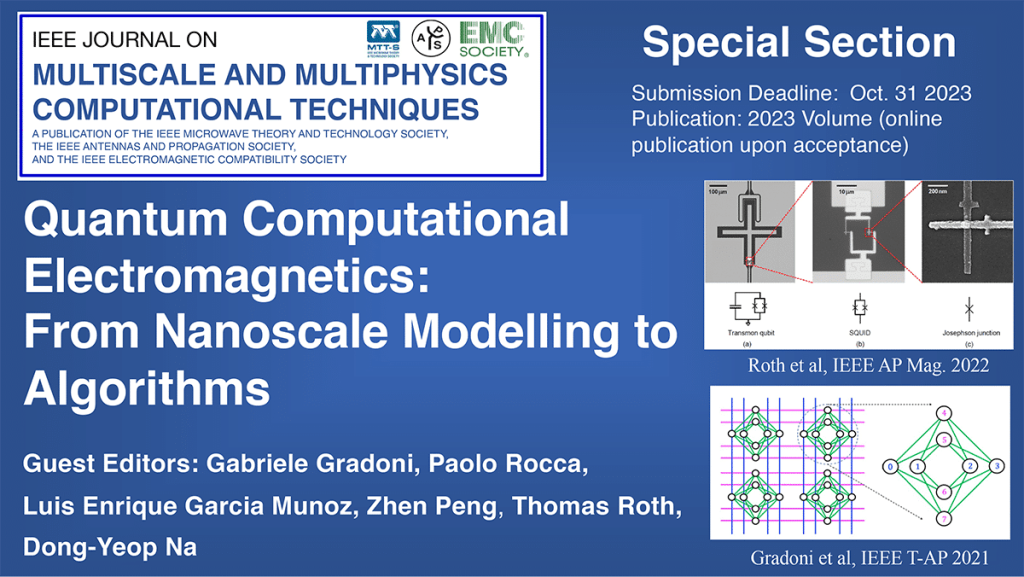
Expected online publication: 2023 Volume
The 2023 volume of the IEEE Journal on Multiscale and Multiphysics Computational Techniques (IEEE J-MMCT) will include a special section dedicated to ‘Quantum Computational Electromagnetism: From Nanoscale Modelling to Algorithms’. Recent advances in quantum physics are radically transforming Electromagnetics Engineering methodologies is several different ways. This special issue reports the latest achievements and future perspectives in the encounter of quantum mechanics with electromagnetism, with emphasis on computational methods and physics-based modelling at nanoscales. Topics include but are not limited to mathematical methods for quantum information; computing architectures for solving large computational electromagnetic problems; quantum effects at the nanoscale; interaction between electromagnetic field and particles. Focus will be devoted to applications oriented to antenna/waveguide/cavity design and analysis, microwave device architectures for qubits, numerical schemes conceived for general-purpose quantum computers, quantum security schemes, quantum radars, quantum sensors, related performance under quantum noise, and quantum circuit implementation. This special issue is brought together for the first time with effort from both the IEEE AP, EMC, and MTT societies.
The topics of the Special Issue include, but are not limited to:
a) Ising Models and Quantum Annealing (Scalability and performance, Spin Glasses)
b) Universal Gate Quantum Computation (Noise and Gates)
c) Quantum Mathematics and Numerics (Variational methods, finite differences)
d) Quantum Search and Security Algorithms (Random graphs, Markov chains, QKD)
e) Semi-classical Analysis and Boundary Value Problems (Cavities, waveguides, quantum chaos)
f) Quantum Effects in Nanoscale Devices (Scattering, density functional theory (DFT))
g) Quantum devices (antennas, sensors, radars, atomic circuits, lasers)
h) Foundations and Open Problems (Classical and quantum fields, Quantum Spin Glasses)
Paper submission is accomplished through the ScholarOne Manuscript Central website:
https://mc.manuscriptcentral.com/jmmct-ieee
When you start a new submission to the special section, please choose Special Section Title as the type of your submission.
When you prepare your manuscript you should consult the instructions, templates and resources available at the IEEE Authors’ Center (https://ieeeauthorcenter.ieee.org). Papers not following the standard IEEE journal template cannot be accepted into the peer review process. Please be aware that your contribution should be prepared as any other regular J-MMCT paper and that it will be evaluated via the same peer-review process. The quality of your contribution must meet the level required for a publication at J-MMCT.
Other Submission instructions:
(1) The conference paper(s) must be included along with the submission as supplementary files.
(2) You must reference your own work, especially recent journal/conference publications. Discuss your related publications in the introduction. Distinguish the new results you present in your current manuscript from those found in your previous publications, to demonstrate that the paper includes sufficient new technical material to justify a new paper, when compared to all previously published papers.
Submissions are accepted any time, but no later than October 31, 2023.
If you have any questions, you can contact the Editor-in-Chief (Prof. Costas Sarris at eic-jmmct@ieee.org), or the Guest Editors:
Gabriele Gradoni (Lead)
Gabriele.gradoni@nottingham.ac.uk
Paolo Rocca
paolo.rocca@unitn.it
Luis Enrique Garcia Munoz
luisenrique.garcia@uc3m.es
Zhen Peng
zvpeng@illinois.edu
Thomas Roth
rothte@purdue.edu
Dong-Yeop Na
dyna22@postech.ac.kr